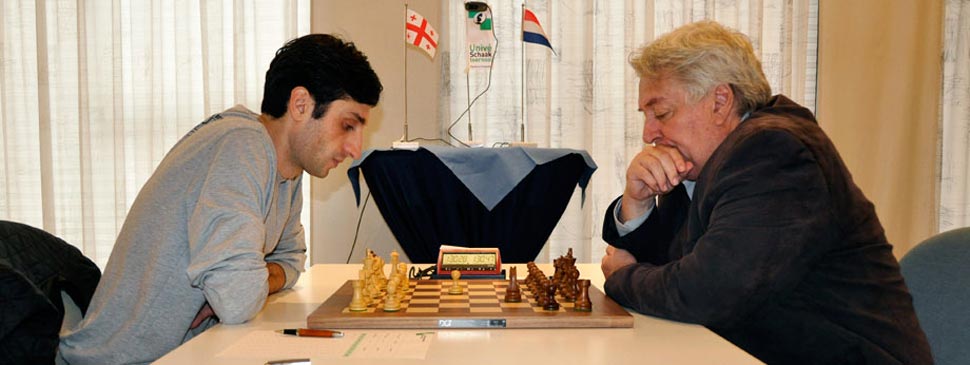Invite the right players and you’ll be amazed at what can happen in two games in one day. What happened today in the Univé matches defies all description. Let’s try anyway. With incredibly deep preparation Anish Giri laid the foundation for a second victory in an epic game. Jan Timman played well against Baadur Jobava for a long time, but he blundered at the moment the Georgian had cleverly mounted the tension.
We will start in a minor key – at least from a Dutch standpoint. Timman hardly had any problems for a long time. Jobava did get a little something with white, but he also spent a lot of time: It was a complex middlegame. At certain points I had trouble finding the right move, I was the one choosing the plans all the time’, the Georgian said afterwards. Í still have to get into the match – maybe also my form is not so good.’ Timman couldn’t take any profit from this – on the contrary, when Jobava only had about three minutes left, the player from Arnhem went wrong.
Jobava - Timman
1.d4 Nf6 2.c4 e6 3.Nf3 b6 4.a3 Ba6 5.Qc2 Bb7 6.Nc3 c5 7.e4 cxd4 8.Nxd4 Nc6 9.Nxc6 Bxc6 10.Bf4 Nh5

11.Bd2
11.Be3 Bd6?? 12.Qd1 1–0 was the famous game Christiansen-Karpov, Wijk aan Zee 1993, as was subtly mentioned in the aftertalk by the gentlemen from Chess24.
11...Qc7
Gusty proposed 11...Qf6 here, to which Jobava off-hand opted for 12.0–0–0!?. This gut reaction says a lot about a player.
12.g3
Timman was following a game Jobava-Iturrizaga, Khanty-Mansiysk 2009, where 12.Nd5 Qb7 was played, and White now simply left the piece to be taken: 13.Bd3 Bd6 14.0–0 Qb8 15.g3 exd5 16.exd5 Bb7 17.Rfe1+ Kd8 18.Bc3 Nf6 19.b4 Qc7 20.Qb2 Kc8 21.Bxf6 gxf6 22.Qxf6 Rd8 23.Rac1 Bf8 24.c5 bxc5 25.bxc5 a5 26.c6 dxc6 27.dxc6 Ba6 28.Bf5+ Kb8 29.Qxd8+ Qxd8 30.c7+ 1–0. Jobava: ‘I tried to remember this game, but I couldn’t, of course.’
12...Bc5 13.Bg2 0–0 14.0–0 Rac8 15.Rac1 Nf6
A difficult, but brave decision.
16.b4 Be7 17.Qd3 Qb8 18.h3 Rfd8
Jobava thought this was wrong, and recommended 18...d6. Now White gets some pressure, but it was still hard to find the right move every time, and Jobava used up a lot of time in this phase.
19.Rfe1 Bb7 20.e5 Ne8 21.Ne4 d6 22.exd6 Bxd6
22...Nxd6 was deemed more logical by the (ex-)champions in the pressroom, as on 23.Bf4 Black has 23...Qa8.
23.Qe2

23...Be5
Jobava didn’t think this wasn’t good either: 23...Be7 was safer.
24.c5
Here Gusty came up with the trick 24.Ng5! Bxg2 25.Qh5. Now after 25...Qb7 26.Qxh7+ Kf8 27.Qh8+ Ke7 28.Rxe5 Rxd2 29.Qg8 White keeps a tremendous attack. ‘Yes, Black has problems. He’s created them himself with 23...Be5’, Jobava said. Still it’s strange that the Georgian swashbuckler didn’t go for this line.
24...bxc5 25.bxc5
The intermediate move 25.Bg5 was annoying; Black has to allow his structure to be weakened after 25...Bf6.
25...Bc6 26.Ba5 Rd7
26...Rd4 was proposed; then the rook could possibly go to a4. But after 27.Bc3 Rd7? (better 27…Rd8) 28.Bxe5 Qxe5 White wins with 29.Nd6!.
27.Ng5 Bxg2 28.Kxg2 Bf6
Afterwards, Timman doubted if this move was good, but it turns out that Black is still OK here.
29.c6

‘I wanted to try something’, said Jobava. On 29.Ne4 Black has 29...Qa8!, just like later in the game.
29...Rd5??
A blunder in his opponent’s time trouble. 29...Rd6 had to be played.
30.Nxf7!
Such chances Jobava will never miss, even in bad time trouble.
30...Rxa5 31.Qxe6 Kf8

32.Rcd1?
Here 32.Qd7! was winning. White threatens Rc1-b1-b7 and if Black plays 32...a6, then 33.Re6! wins, with the threat of 34.Rce1. If Black prevents this with 33...Nc7 then 34.Nh6! forces an elegant mate.
32...Qc7?
Now Timman misses the save, which could be found in the subtle move 32...Qa8!. Rhen 33.Nd8 doesn’t work in view of 33...Rxd8 34.Rd7 Rxd7 and the queen protects the Ne8, for instance 35.Qxd7 Rc5 and Black wins.
33.Nd8! Rxd8 34.Rd7
Resigned. ‘Incredibly stupid’, Timman said. ‘I guess I was a little bit lucky’, his opponent sniggered.
Video: Peter Doggers
The other game was watched with astonishment in the commentary room. ‘All the difficult moves are played after only seconds’ thought’, said Van der Wiel. ‘This has to be preparation.’ And so it soon turned out to be. And Giri was the one who was best prepared.
Giri - Shirov
1.d4 d5 2.c4 c6 3.Nc3 Nf6 4.e3 e6 5.Nf3 Nbd7 6.Qc2 Bd6 7.Bd3 0–0 8.0–0 dxc4 9.Bxc4 b5 10.Be2
In their game in 2010 Giri played 10.Bd3.
10...Bb7 11.e4 e5 12.dxe5 Nxe5 13.Nd4
This looks quite dangerous in view of the reply:
13...Neg4

14.g3!
14.h3? Bh2+ 15.Kh1 Nxf2+! 16.Kxh2 Qxd4 is good for Black. But Giri had hoped that his opponent would go for this. ‘I think my heartbeat went up here for a while, when I noticed that he was prepared to repeat his Bundesliga game from earlier this year. I had found something I thought was winning.’
14...Bc5
Everything à tempo. With 14...Bxg3 abandons his beautiful bishop: 15.hxg3 Qxd4 16.Qd1 (16.Bf4 Qc5! 17.b4 Qh5) 16...Qxd1 17.Rxd1 Rfd8. Apparently White has sufficient compensation here, as Shirov didn’t go for this. Not in April, and not now.
15.Nf5 Re8!
15...Qb6 16.Bxg4 Nxg4 17.b4 Bxb4 (17...Bd4 18.Bb2) 18.Qb2 Bxc3 19.Qxc3 Nf6 20.Be3 gives White great play.
16.Bf4 Qb6 17.Kg2!

17...Nxf2
If this doesn’t work, 17...g6!? looks like an important alternative. 18.h3 gxf5 19.hxg4 Nxe4 20.gxf5 Nxc3 21.bxc3 Be7 and White is a tad better.
18.e5
Not immediately 18.b4? Bxb4 19.Rxf2 Bxc3 and e4 is hanging.
18...Nd7 19.b4 Bxb4 20.Rxf2 Nxe5

Spectacular. But Shirov had even had this position on the board in his Bundesliga game.
21.Ne4
Rhis is the novelty! In the game Dennis Wagner-Shirov, Eppingen 2014, White played the very sharp 21.Nxg7 c5+ 22.Kh3 Bc8+ 23.g4 Kxg7 24.Bxe5+ Rxe5 25.Rxf7+ Kxf7 26.Qxh7+ Ke6 27.Qg6+ Ke7 28.Qg7+ Ke6 29.Qh6+ Ke7 30.Qh7+ Ke6 31.Qg6+ Ke7 32.Qg7+ Ke6 33.Qg6+, draw agreed.
21...c5 22.Kf1!
This is the idea. At first, the computer doesn’t believe in 21.Ne4, until you enter the text move. All kinds of nasty things are threatened on d6, and maybe in some cases also on h6, so Black exchanges:
22...Bxe4 23.Qxe4 Ng6!
After some thought. Certainly not 23...Ng4?? 24.Ne7+ and on the next move the Ng4 will fall, because the rook on a8 is still hanging.
24.Qd5 Nxf4
24...Rad8 25.Bd6! (after 25.Nd6?, 25...Rf8! followed by 26...c4 is very painful; the Nd6 will be lost) 25...Re6 26.Qf3 and White keeps pressure.
25.Ne7+! Kh8 26.Rxf4 c4 27.Nc6 Bc3
27...Qe3 looks more tenacious, but the white king simply walks out with 28.Bf3 Bc5 29.Kg2.
28.Rb1 Rac8 29.Bf3

29...Qa6
He still finds a weak spot in the white position.
30.Re4!?
30.Rxb5 Qxa2 31.Be4 seems to leave Black without a chance: the threat of 32.Rh4 is devastating.
30...Qxa2 31.Rxb5 Qxh2 32.Qd7 Rf8 33.Rh4
Giri: ‘I had missed Black’s reply in my calculations. Now I saw that after the coming liquidation the position was hard to win, so here I took a long time calculating 33.Rh5. But after 33...Qxg3 I didn’t see any win.’ Rhere can follow: 34.Rh3 Rc7 35.Qf5 g6.
33...Qc2

34.Rxh7+ Qxh7 35.Rh5 Qxh5 36.Bxh5 g6 37.Be2 Kg7 38.Bxc4 Rce8 39.Qxa7 Bf6 40.Qd7 Re3 41.Kg2 Rc3 42.Qd5 Re3 43.Kf2 Ree8 44.Qd7 Re4 45.Bd5 Ree8 46.Qc7 Rc8 47.Qb7 Rce8 48.Qd7 Ra8 49.Bc4 Rae8 50.Kf3
Not so clever is 50.Bxf7? Re7! 51.Nxe7 Bxe7 52.Qxe7? Rxf7+.
50...Re1 51.Qd5 Re6 52.Qd7 Re1 53.g4!?
The most problematic try for Black.
53...Bg5 54.Qd5 f5
Black would prefer to play 54...Bf6, but then 55.g5 comes with tempo: 55…Ba1 and now 56.Kg2 (the direct 56.Nd8 doesn’t work yet on account of 56...Rc1 57.Nxf7? Rxc4) 56...Re3 57.Qd6 (again, not 57.Nd8? Re5) and now the black pieces will be in trouble, e.g. 57...Re4 58.Qd1 Bb2 59.Qc2. If the rook lets go of e5, White plays Ne5 and after the exchange, the pawn on g6 will fall eventually.
With the black king’s position open, the white pieces finish off.
55.Ne5 fxg4+ 56.Kg2 Be3 57.Qd7+ Kh6 58.Nxg4+ Kh5

59.Nf6+!
Winning the exchange.
59...Rxf6 60.Qh3+ Kg5 61.Qg3+ Kh6 62.Qxe1
And Black resigned on move 75.
Video: Peter Doggers

 .
. 






















